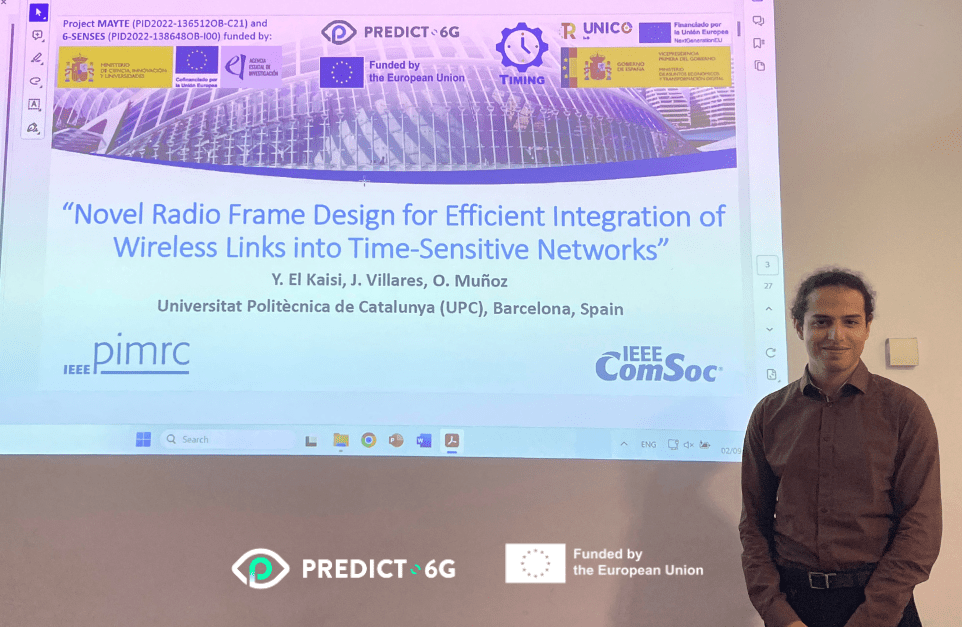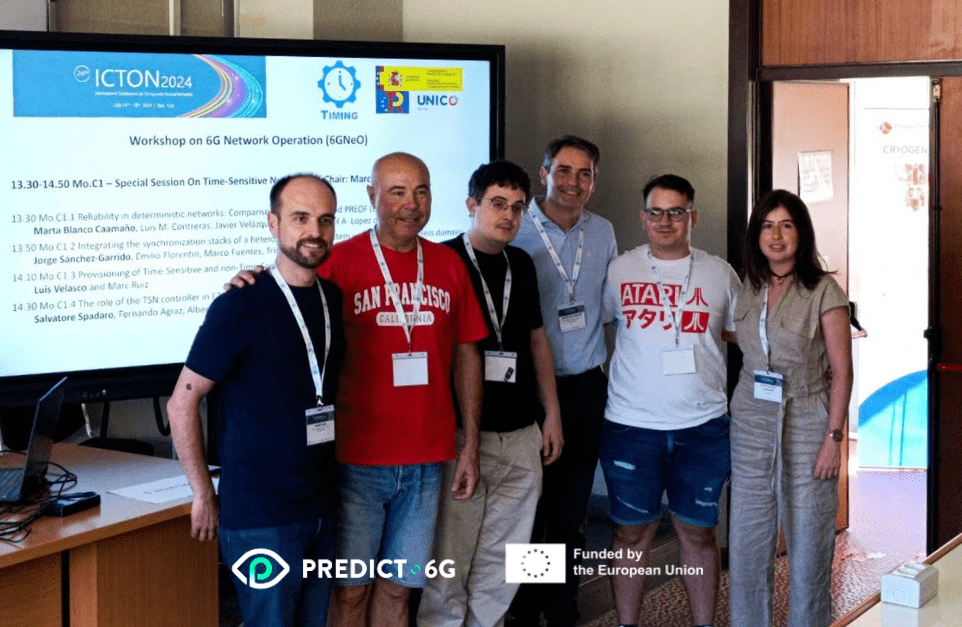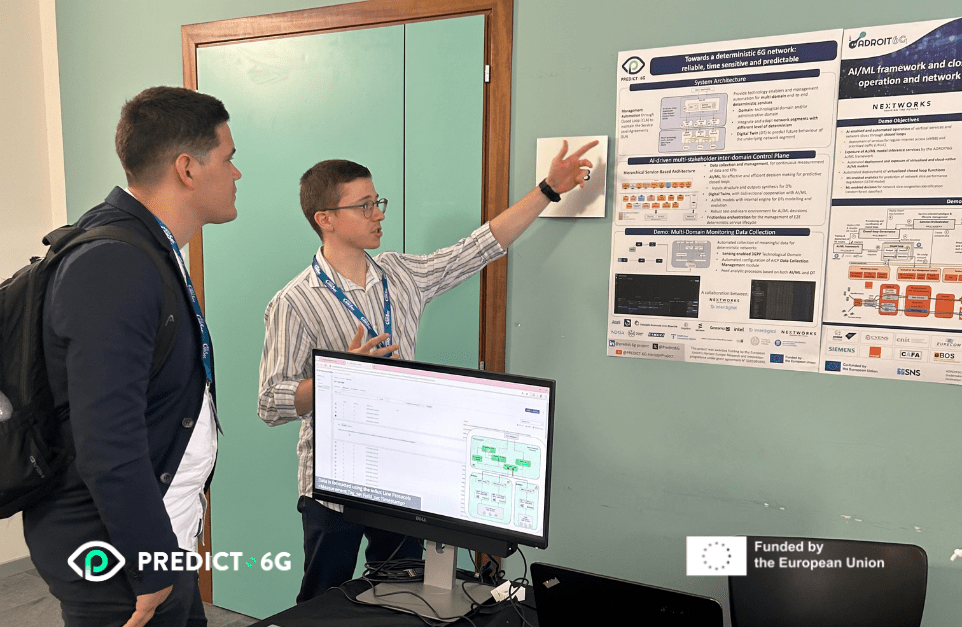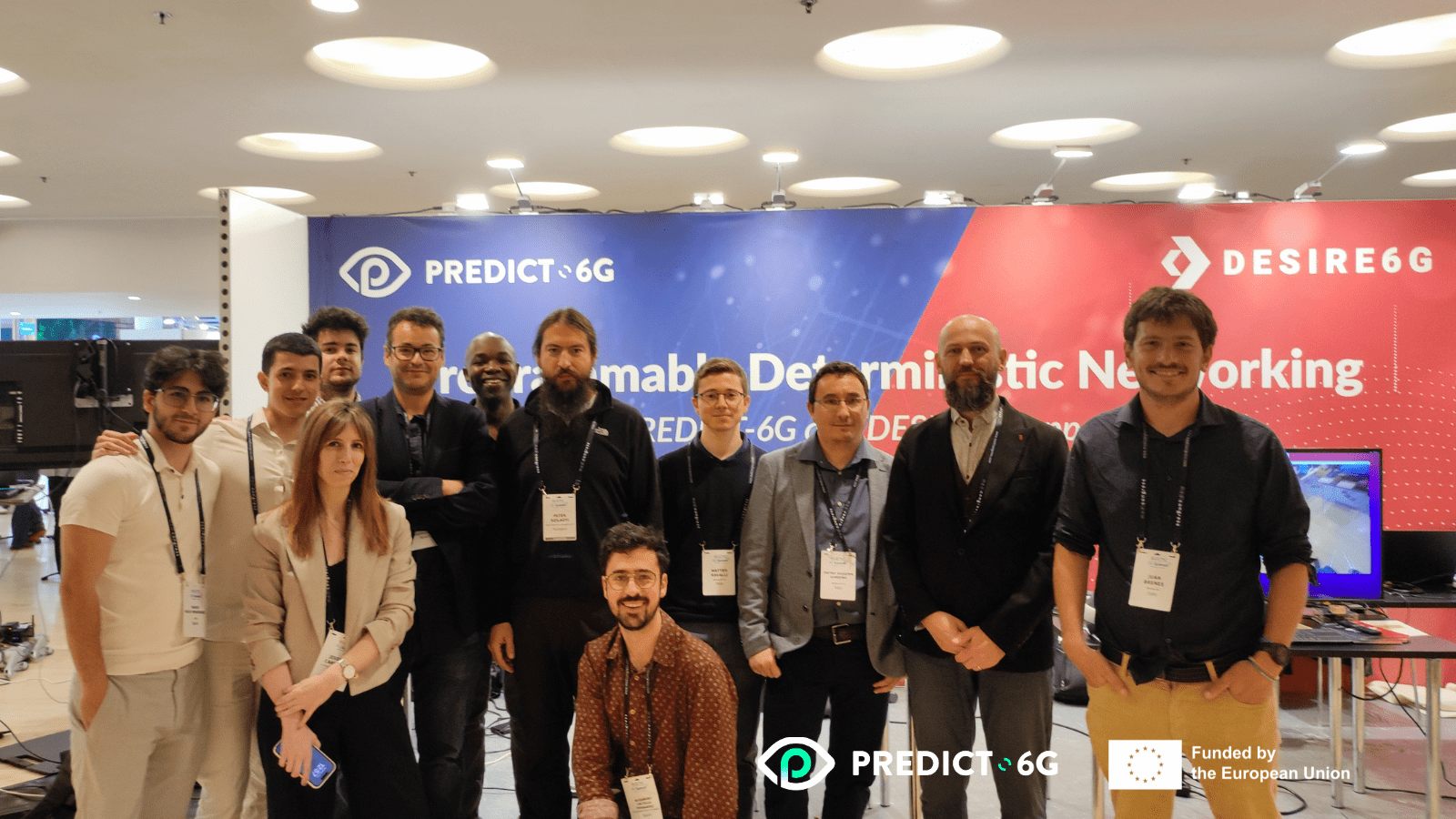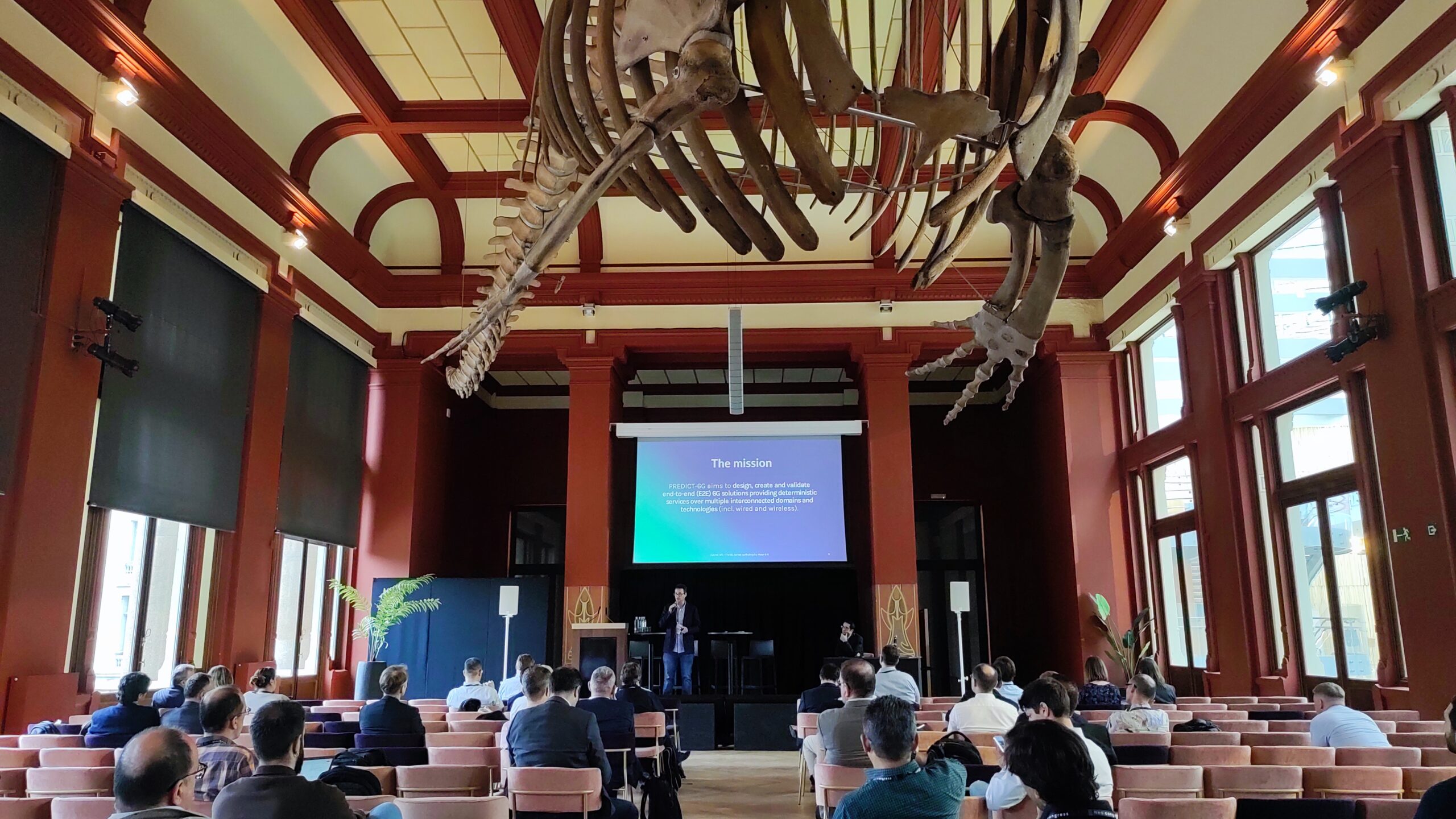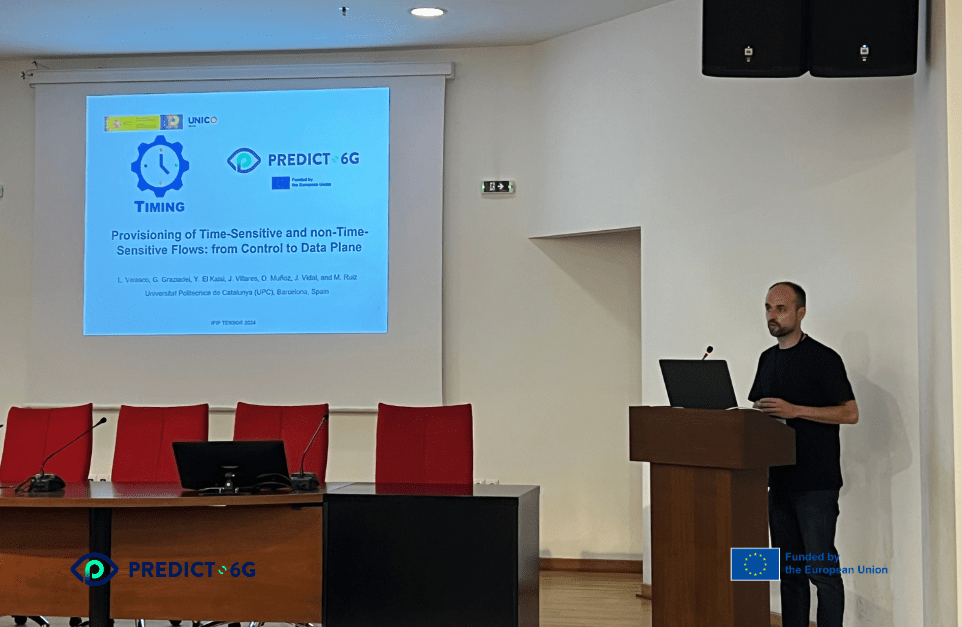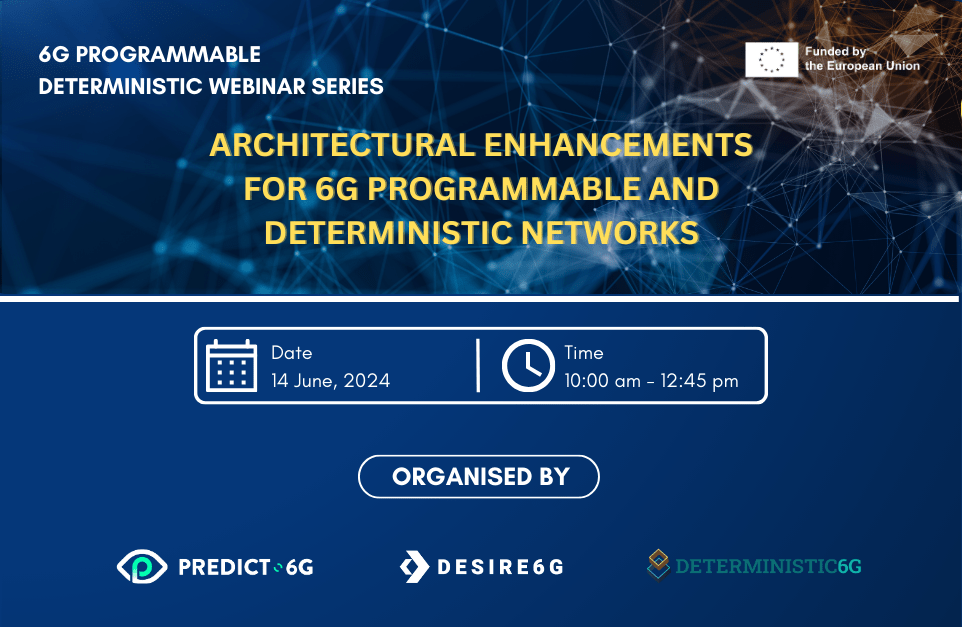UPCOMING EVENTS
PREDICT-6G is in its final year and the consortium partners are showcasing progress on the project, presenting the latest publications and papers at various events taking place in the coming months. Here is a list so you don't miss any of the events taking place between October and December 2024.
PLENARY MEETING
From 15-16 October the PREDICT-6G consortium, with representation from all partners, will meet in Budapest, Hungary, for its second plenary meeting of 2024. Hosted by Nokia, it will be a key meeting to analyse what has been achieved so far, but above all to trace the roadmap for the final months of the project, defining the next demos and assessing the work that remains to be done on the use cases to put all the technological advances into practice.
The “6G Programmable Deterministic Webinar Series: Wireless-friendly TSN scheduling”
The “6G Programmable Deterministic Webinar Series'' is a collaborative initiative between PREDICT-6G, DESIRE6G, and DETERMINISTIC6G launched on the 14 of June 2024. This quarterly series aims to explore the intricate and transformative aspects of these sister projects, featuring expert speakers who will discuss the latest developments and innovations shaping the future of 6G technology. Each session provides in-depth information and fosters key discussions for practitioners and researchers dedicated to the next generation of wireless communications.
The second webinar titled “Wireless-friendly TSN scheduling” will take place on the 22 October 2024 at 14:00 - 17:00. The agenda is coming very soon! In the meantime, he first webinar, titled "Architectural Enhancements for 6G Programmable and Deterministic Networks" is available here.
5G TECHRITORY
The new edition of the 5G Technology Forum “Technology Shaping Tomorrow’s Territory” will take place on the 30-31 of October 2024 in Riga, Latvia. Over two days, more than 600 players in 5G will meet to develop a robust and aligned 5G Ecosystem in Europe and beyond.
Facilitated by the SNS JU ambassador project SNS ICE, PREDICT-6G’s live demonstration: 'Real time gesture based remote control of a digital twin', recorded during EuCNC 2024, will be part of a video medley alongside other SNS projects. The session, entitled ‘Interactive Showcase: SNS ICE showroom’, will focus on promoting the goals and highlights of the work performed within the SNS JU. The full demo ‘Real Time Gesture Based Remote Control Of A Digital Twin’ by UC3M and 5TONIC is available here.
MOBICOM 2024
The Annual International Conference on Mobile Computing and Networking (MobiCom 2024) will be held on the 18-22 of November in Washington DC, USA. In this scope, DESIRE6G, DETERMINISTIC6G and PREDICT-6G will co-organise the 2nd workshop on "6G Programmable Deterministic Networking with AI" (6G-PDN 2), which will take place on the 18th November. More information on this event can be found here.
IEEE Globecom 2024
The 2024 IEEE Global Communications Conference (GLOBECOM) will be held from 8-12 December 2024 in Cape Town, South Africa. It is one of the IEEE Communications Society’s two flagship conferences dedicated to driving innovation in nearly every aspect of communications. Under the theme ‘Connecting the Smart World Across Africa’, the 2024 edition will feature a comprehensive and high-quality technical programme including 13 symposia and a variety of tutorials and workshops. PREDICT-6G will feature the presentation of the paper ‘Standardisation Assessment of a Digital Twin-Based Multi-Domain Deterministic Communications System’ within the session 6GArch: 4th Workshop on 6G Architecture. The paper is a joint collaboration of several partners of the PREDICT-6G consortium: InterDigital, Carlos III University of Madrid, Politecnico di Torino, Universitat Politècnica de Catalunya, Nextworks, Telefónica, Nokia and Intel; led by Sebastian Robitzsch, PREDICT-6G standardisation coordinator. You can read the paper here.
If you want to stay updated about PREDICT-6Gt, subscribe to our newsletter and follow us on Twitter and LinkedIn!
Join PREDICT-6G at MobiCom 2024
The Annual International Conference on Mobile Computing and Networking (MobiCom 2024) will be held on the 18-22 of November in Washington DC, USA. In this scope, DESIRE6G, DETERMINISTIC6G and PREDICT-6G will co-organise the 2nd workshop on "6G Programmable Deterministic Networking with AI" (6G-PDN 2), which will take place on the 18th November.
The objective of this workshop is to discuss the roadmap and challenges in the technology areas of deterministic communications and deep network programmability in 6G to support future end-to-end time-critical applications. It also aims to bring together academic and industry researchers to stimulate discussions, introduce news ideas and technical solutions in the aforementioned areas and therefore contribute to the progress of 6G networking research.
The programme features Amir Gomroki, Head of 5G for North America and 5G-ACIA Ambassador for Ericsson Research, and Ashutosh Dutta, Senior Scientist, 5G Chief Strategist at Johns Hopkins University Applied Physics Laboratory and Director of the Doctor of Engineering Program at Johns Hopkins University, as keynote speakers.
Following an open call for papers, the selected authors will discuss in-depth various aspects of deterministic networks:
- Experimental Evaluation of a Multi-Domain TSN Scenario in Industry 4.0, first author: David Rico-Menéndez (University Carlos III Madrid).
- Routing-Aware Shaping for Feasible Multi-Domain Determinism, first: Andrea Francini (Nokia Bell Labs).
- Environmental-aware Reinforcement Learning-based Scheduler for Trustworthy 6G in the Factory Floor, first author: Fjolla Ademaj-Berisha (Silicon Austria Labs GmbH).
- Lightweight INT on the Tofino programmable switch, first author: Angelos Dimoglis (University of Amsterdam).
- An Architectural Framework for 6G Network Digital Twin, first author: Zhiheng Yang (University of Amsterdam).
- Artificial Intelligence Control Plane for Deterministic Networks Proof-of-Concept, first author: Alejandro Calvillo-Fernandez (University Carlos III Madrid).
Read the workshop programme here. Register and join us!
If you want to stay updated about PREDICT-6Gt, subscribe to our newsletter and follow us on Twitter and LinkedIn!
PREDICT-6G at ETFA 2024
The 29th IEEE International Conference on Emerging Technologies and Factory Automation (ETFA) 2024 took place from 10 to 13 September 2024 in Padova, Italy. This conference brings together professionals from industry and academia to share cutting-edge concepts, recent developments, research results, and practical achievements in industrial and factory automation. The key goal is to foster the enhancement and application of scientific techniques, models, and tools that support the efficient design and operation of industrial and factory automation systems. Several PREDICT-6G partners were there to present work related to the project.
Pietro Giuseppe Giardina from Nextworks was invited to talk in the Industry Forum of the conference. In the talk, titled 'Bringing determinism in private mobile networks for Industry 5.0 scenarios: opportunities and challenges', he explained the benefits of adopting 5G/6G technologies in the industry and how the research can foster such an adoption with two example projects: PREDICT-6G and Zero-SWARM.
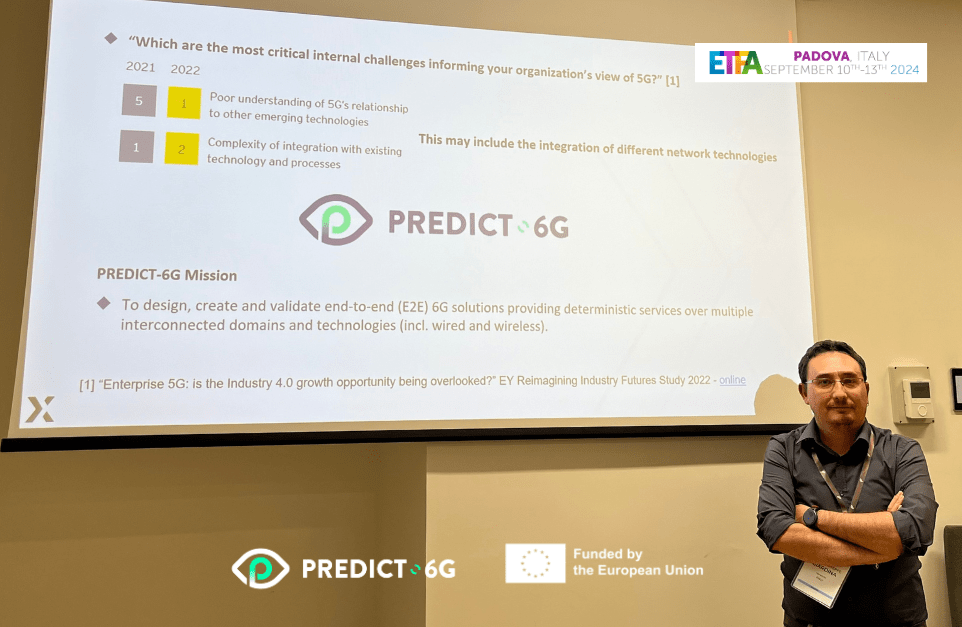
In the Technical Track “TSN in Industrial Systems”, Claudio Zunino, principal investigator of Consiglio Nazionale delle Ricerche (CNR), presented the paper ‘Time-Sensitive Networking and Software-Defined Networking: an experimental setup for realistic performances’. Written by the CNR, Intel, the University of Padova (all members of the PREDICT-6G consortium), and the University of Modena and Reggio Emilia, this paper investigates the integration between Time-Sensitive Networking (TSN) and Software-Defined Networking (SDN) to enable dynamic network re-configuration and improve performance for time-critical applications. The paper can be read and downloaded here.
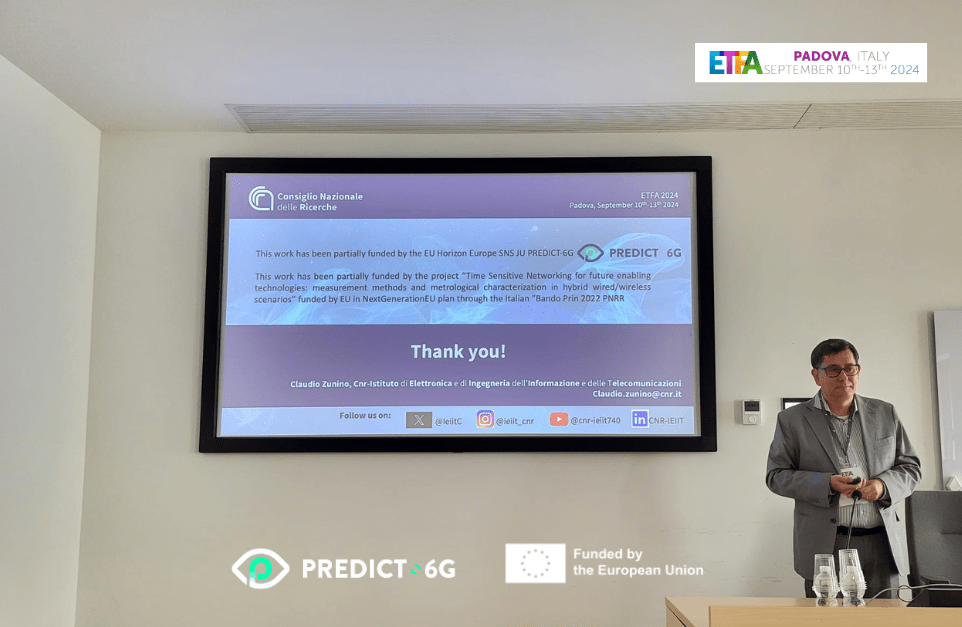
During the “Industrial Communication Technologies and Systems” session, Prof. Zunino presented the paper ‘IEEE 1588 (PTP) over mmWave 5G NR: preliminary assessment of the synchronization accuracy for TSN applications’ produced by PREDICT-6G partners CNR and the University of Padova, as well as by the University of Modena and Reggio Emilia. The paper discusses the extension of TSN to wireless domains for realising the Industry 4.0 and 5.0 applications. It focuses on the assessment of the synchronization accuracy of IEEE 1588 (PTP) over 5G NR networks.
Lastly, INTEL, CNR and the University of Padova presented the ‘Time-Sensitive Networking for Trajectory Tracking of an Unmanned Ground Vehicle over Wi-Fi’ paper in the Special Session - Exploring the limits of Time Sensitive Networking. Utilising the IEEE 802.1AS standard for wireless time synchronization, this study investigates the impact of clock synchronization errors and latency on trajectory tracking in a wireless network scenario involving an Unmanned Ground Vehicle (UGV). It demonstrates the capability and benefits of IEEE 802.1AS in managing device clocks and facilitating time correction to ensure precise trajectory tracking despite synchronization errors and latency.
If you want to stay updated about PREDICT-6Gt, subscribe to our newsletter and follow us on Twitter and LinkedIn!
IEEE International Symposium on Personal, Indoor and Mobile Radio Communications (PIMRC) 2024
IEEE International Symposium on Personal, Indoor and Mobile Radio Communications (PIMRC) took place on the 2-5 September 2024 in Valencia, Spain. Under the theme “Elevating 6G Beyond Connectivity”, PIMRC is one the flagship conferences for IEEE Communications Society with a special focus on cutting-edge wireless technology research and innovations. PREDICT-6G was represented by two consortium partners.
Universitat Politècnica de Catalunya attended PIMRC to present the paper 'Novel Radio Frame Design for Efficient Integration of Wireless Links into Time-Sensitive Networks' as part of the Workshop on Industrial Wireless Network. This paper presents a novel radio frame design for wireless links that enables the efficient scheduling of multiple time-sensitive flows with arbitrarily small packet jitter and delay requirements. The benefits of the approach described in the paper are numerically evaluated in an illustrative industrial scenario that shows a substantial gain in terms of both reduced control cycle (periodicity of flows) and improved transmission performance (number of supported flows).
The paper was presented during the conference by the student Youssef El Kaisi Rahmoun. It can be read and downloaded here.
Politecnico di Torino also attended PIMRC to present the paper ‘Target Wake Time Scheduling for Time-Sensitive Networking in the Industrial IoT’. In this paper, POLITO “demonstrate that Target Wake Time-Acceptance and Scheduling Problem-Efficient Resolver (TASPER) schedules traffic with up to 21.23% higher priority-weighted admission ratio and saves up to 7.42% energy compared to the ShortestFirst strategy, all while satisfying AoI constraints for 99.5% of transmissions”. It can be read and downloaded here.
If you want to stay updated about PREDICT-6Gt, subscribe to our newsletter and follow us on Twitter and LinkedIn!
PREDICT-6G at ICTON
The International Conference on Transparent Optical Networks (ICTON) 2024 was held from 14 to 18 July 2024 in Bari, Italy. It focused on applications of transparent and all-optical technologies to telecommunications, computing, sensing and quantum applications. Various PREDICT-6G partners attended the event.
Universitat Politècnica de Catalunya organised the 6G Network Operation (6GNeO) workshop as part of ICTON, with a special session on Time Sensitive Networking (TSN) and Deterministic Networking (DetNet). In this session, Telefónica Innovación Digital presented the paper ‘Reliability in deterministic networks: Comparison of FRER (TSN) and PREOF (DetNet)’, which was developed in the framework of PREDICT-6G.
“Telefónica showcased various techniques aimed at enhancing network reliability through the use of TSN and DetNet”, explains Marta Blanco Caamaño, first author of the paper and the person in charge of presenting the work at the 6GNeO workshop. The paper can be read and downloaded here.
If you want to stay updated about PREDICT-6Gt, subscribe to our newsletter and follow us on Twitter and LinkedIn!
PREDICT-6G at IEEE HPSR
The IEEE 25th International Conference on High Performance Switching and Routing (HPSR) was held 22-24 July 2024 in Pisa, Italy. The main focus of the HPSR 2024 was to assess how breakthrough changes occurring to networks and telecom are affecting areas related to switching and routing, and communication networks in general.
PREDICT-6G was represented by our consortium member Nextworks, which had a booth showcasing a poster and the screening of the demo jointly developed with InterDigital: “Monitoring Data collection Integration with a Sensing-Enabled 3GPP Technology Domain”. The demo presents a multi-domain monitoring data collection for the PREDICT-6G project. It automates the collection of Layer 4 latency and sensing data from a 3GPP domain, feeding it into an AI-driven control plane and a digital twin application. The demo integrates the AI-Driven Control Plane (AICP) to manage service provisioning and data monitoring. You can watch it here.
If you want to stay updated about PREDICT-6Gt, subscribe to our newsletter and follow us on Twitter and LinkedIn!
Upcoming events
PREDICT-6G is entering its last year and the consortium partners are showing the progress in the project, presenting the latest publications and papers in several events that will take place in the coming months. Here is a list so you do not miss any of them.
ICTON 2024
The International Conference on Transparent Optical Networks (ICTON) 2024 will be held from 14 to 18 July in Bari, Italy. The conference and side events will focus on applications of transparent and all-optical technologies to telecommunications, computing, sensing and quantum applications. Luis Miguel Contreras from Telefonica will present the paper “Reliability in deterministic networks: Comparison of FRER (TSN) and PREOF (DetNet)”, related to the research carried out within the project. The publication is available here.
PIMRC 2024
IEEE International Symposium on Personal, Indoor and Mobile Radio Communications (PIMRC) will take place 2-5 September in Valencia, Spain. Under the theme “Elevating 6G Beyond Connectivity”, PIMRC is one the flagship conferences for IEEE Communications Society with a special focus on cutting-edge wireless technology research and innovations. Professor Carla Fabiana Chiasserini from Politecnico di Torino will attend the conference to present the paper “Target Wake Time Scheduling for Time-SensitiveNetworking in the Industrial IoT”.
ETFA 2024
The 29th IEEE International Conference on Emerging Technologies and Factory Automation, (ETFA) 2024, will take place from 10 to 13 September in Padova, Italy. It brings together professionals from industry and academia to share cutting-edge concepts, recent developments, research results, and practical achievements in industrial and factory automation. The key goal is to foster the enhancement and application of scientific techniques, models, and tools that support the efficient design and operation of industrial and factory automation systems. PREDICT-6G consortium members, CNR and Intel will be at the Conference to present the paper “Time-Sensitive Networking and Software-Defined Networking: an experimental setup for realistic performances”.
IEEE HPSR
The 2024 IEEE 25th International Conference on High Performance Switching and Routing (HPSR) will be held 22-24 July in Pisa, Italy. The main focus of the HPSR 2024 will be to assess how breakthrough changes occurring to networks and telecom are affecting areas related to switching and routing, and communication networks in general. Nextworks, a member of the PREDICT-6G consortium, will be present at HPSR with a booth promoting the project with a poster and a screening of the joint demo with InterDigital: Monitoring Data collection Integration with a Sensing-Enabled 3GPP Technology Domain. You can watch the demo here.
If you want to stay updated about PREDICT-6G, subscribe to our newsletter and follow us on Twitter and LinkedIn!
2024 EuCNC & 6G Summit
The 2024 EuCNC & 6G Summit took place from 3 to 6 of June in Antwerp, Belgium. Bringing together cutting-edge research, trailblazing innovators, and world-renown companies, the event has become a reference in the telecommunications sector. Over 50 exhibitors and 900 participants across 40 countries attest to the relevance of the conference.
PREDICT-6G was determined to repeat the 2023 success in this new edition. A delegation comprising team members from different consortium partners arrived in Antwerp, ready to support the different project activities and to share and discuss the developments of the past year. Project members attended the numerous keynotes, panels, sessions, and tutorials, whilst seizing the networking opportunities during the social activities included in the programme.
The first day of EuCNC began with the set-up of the “Programmable deterministic networking: the PREDICT-6G and DESIRE6G approaches' booth. Co-organised by PREDICT-6G and DESIRE6G, it hosted various demos: “Target Wake Time” by Politecnico di Torino (POLITO), “Smart Factory” by Gestamp and Ericsson, and “Monitoring Data Collection Integration with a Sensing-Enabled 3GPP Technology Domain'' by Nextworks and InterDigital.
“Sancho”, the robot dog starring in the “Real-time Gesture Based Remote Control of a Digital Twin” demo (UC3M), drew a lot of attention from the public. Visitors were invited to experience first-hand how Sancho performs the different commands given to it through gestures that are registered by a camera placed on site and then transmitted.
The “Experimentation in a wireless multi-domain deterministic network” poster by UC3M and Intel was also displayed in the booth. It details the design, development, and performance of single domain solutions to support multi-domain deterministic networking, integrating IEEE 802.11, IEEE 802.1 TSN, and 3GPP 5G over an IETF DetNet overlay.
“EuCNC is a great opportunity not only to show our own work to the event participants, but also to interact with other projects’ members to share ideas and to learn something from each other. PREDICT-6G project attracted a lot of interest for the challenges it faces: many demos and explanations about the system architecture and capabilities were requested at the booth, thus making the team proud for their efforts and honoured to work in such an environment for the project purpose.” said Matteo Ravalli (Nextworks).
PREDICT-6G also participated in three workshops. Prof. Antonio de la Oliva (UC3M), PREDICT-6G coordinator, delivered a presentation in the “The 6G series workshop by Hexa-X-II”. Dr. Sebastian Robitszch (InterDigital), chair of PREDICT-6G Standardisation Advisory Board, moderated the “Architectural Considerations Enabling the IMT 2030 Framework by European 6G R&D Activities” workshop. Lastly, Valerio Frascolla (INTEL), PREDICT-6G innovation manager, delivered a presentation in the “Trials, Pilots and Demos for Selected Verticals: the Experimental Way Forward towards 6G” workshop.
The PREDICT-6G communication efforts during the EuCNC & 6G Summit, led by AUSTRALO, were recognised with the “Best Social Media Presence Award”. This honour acknowledged the long-term commitment of the project with the communication and dissemination of its activities and outcomes to the large public.
The participation of PREDICT-6G was a great success. The project team exchanged with other SNS projects, researchers and experts about the current hot topics and the upcoming trends. Furthermore, it promoted the work carried out in the past year and a half in various areas of the project.
The 2024 EuCNC & 6G Summit is sponsored by the IEEE Communications Society (ComSoc), the European Association for Signal Processing (EURASIP) and the European Association on Antennas and Propagation (EurAAP), and focuses on all aspects of telecommunications ranging from 5G deployment and mobile IoT to 6G exploration and future communications systems and networks, including experimentation and testbeds, and applications and services.
If you want to stay updated about PREDICT-6G, subscribe to our newsletter and follow us on Twitter and LinkedIn!
International Federation for Information Processing (IFIP) Networking 2024 Conference
The International Federation for Information Processing (IFIP) Networking 2024 Conference was held from 3 to 6 June in Thessaloniki, Greece. The main objective of this year's edition was to bring together academic and industrial experts of the networking community to discuss the most recent advances in networking, to highlight key issues, identify trends, and develop a vision of the future Internet from a design, deployment and operation standpoints. The sessions and workshops were designed with a special focus on network architectures, applications and services; network modeling, analysis and operation; network security and privacy; and wireless networking.
PREDICT-6G was part of the IFIP Networking Conference with a paper authored by Luis Velasco and Marc Ruiz from Universitat Politècnica de Catalunya, among others. The paper, titled "Provisioning of Time-Sensitive and non-Time-Sensitive Flows: from Control to Data Plane", was presented by Marc at the 4th International Workshop on Time-Sensitive and Deterministic Networking (TENSOR) 2024. The goal of this workshop was to bring together researchers from academia and industry in order to investigate challenging aspects in the area of time- sensitive deterministic communications, as well as identify future research directions for ultra-low latency communications.
"Time-Sensitive Networking (TSN) standards provide scheduling and traffic shaping mechanisms to ensure the coexistence of Time-Sensitive (TS) and non-TS traffic classes on the same network infrastructure. Nonetheless, much effort is still needed on the operation of such TSN capable network infrastructure to ensure that the required performance of the different flows, defined in terms of key performance indicators, can be met once the flows are deployed in the network. In this presentation, we focused on such aspects and proposed a solution involving not only packet schedulers in the data plane, but also network-wide scheduling for TS flows, as well as performance estimation for non-TS flows", stated Marc Ruiz.
The paper is available here.
If you want to stay updated about PREDICT-6G, subscribe to our newsletter and follow us on Twitter and LinkedIn!
6G Programmable Deterministic Webinar Series: #1 Architectural enhancements for 6G programmable and deterministic networks
We are pleased to announce the 6G Programmable Deterministic Webinar Series, a collaborative initiative between PREDICT-6G, DESIRE6G and DETERMINISTIC6G. This quarterly series aims to delve into the intricate and transformative aspects of these sister projects, featuring expert speakers that will explore the latest developments and innovations shaping the future of 6G technology. Each session will provide in-depth information and foster key discussions for practitioners and researchers dedicated to the next generation of wireless communications.
The first webinar will take place on Friday 14 June at 10:00 CET. Under the title ‘Architectural enhancements for 6G programmable and deterministic networks’, it will feature Peter Szilagyi from Nokia, Chrysa Papagianni from the University of Amsterdam, Joachim Sachs from Ericsson and Gourav Prateek Sharma from KTH, followed by a panel discussion on the topic.
Agenda
- 10-10:10. Intro by Carlos J. Bernardos (UC3M)
- 10:10-10:50. Peter Szilagyi (Nokia): “Multi-domain deterministic service management architecture”
- 10:50-11:30. Chrysa Papagianni (University of Amsterdam): "Towards extreme network KPIs with deep programmability in 6G”
- 11:30-12:10. Joachim Sachs (Ericsson) and Gourav Prateek Sharma (KTH): "5G latency analysis and possible improvements"
- 12:10-12:40. Panel: "Architectural enhancements for 6G programmable and deterministic networks"
- 12:40-12:45. Closure
Register here: https://ec.europa.eu/eusurvey/runner/WS1June2024
Link to webinar: https://us06web.zoom.us/j/87094846948
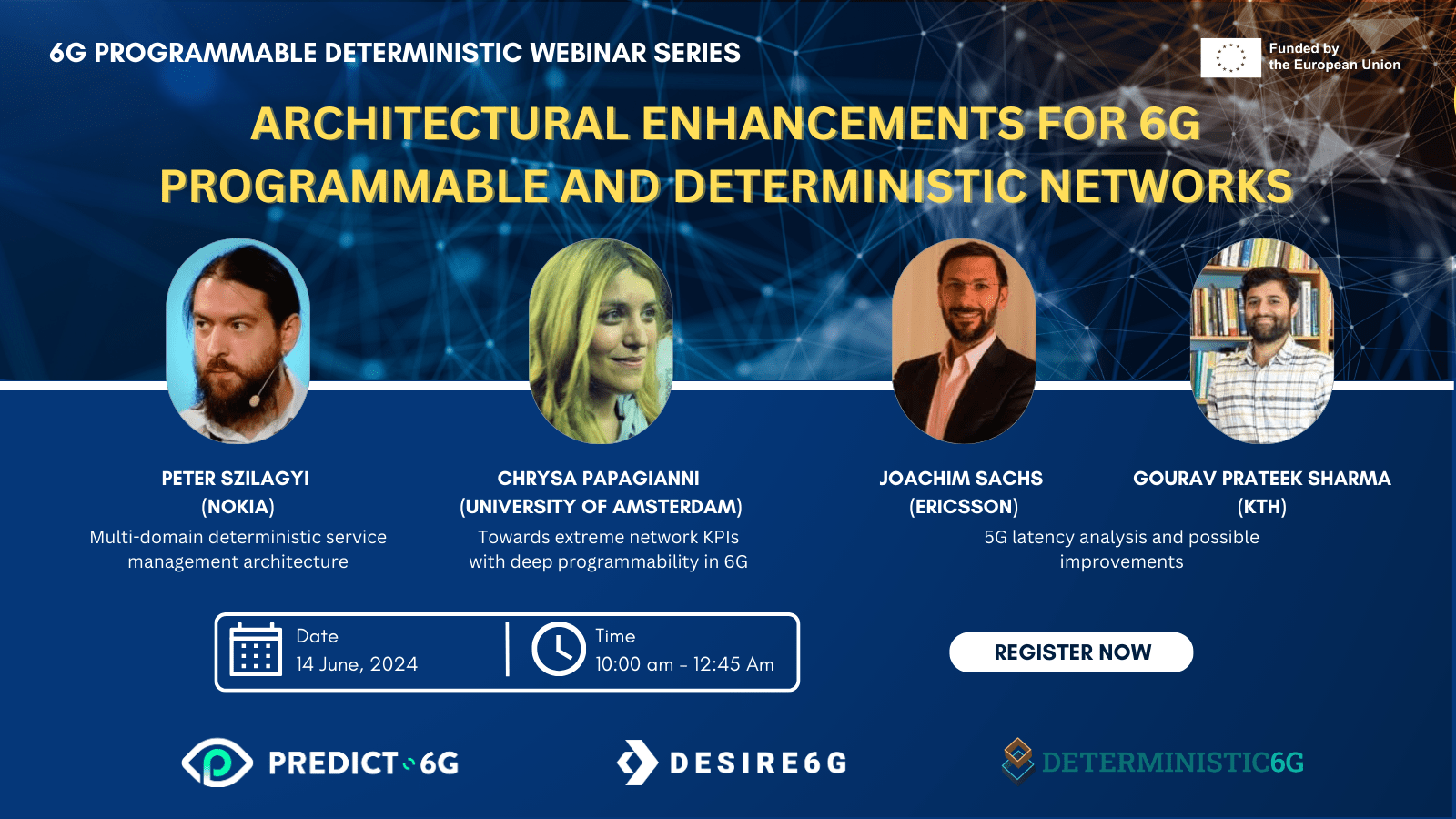
If you want to stay updated about PREDICT-6G, subscribe to our newsletter and follow us on Twitter and LinkedIn!




